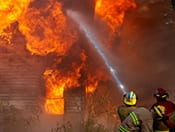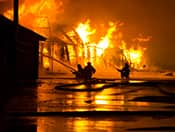Exclusions under Fire Insurance Policy in India
The exclusions of fire insurance policy in India are as follows:
- Willful or intentional damage: Deliberate acts of damage or destruction caused by the insured party are excluded from fire insurance coverage.
- War, invasion, or war-like operations: Losses arising from acts of war, invasion, or war-like operations are not covered under the fire insurance policy.
- Missing or mislaid property: Losses related to property that is missing or misplaced are excluded from coverage.
- Fees or expenses while preparing a claim: Any costs incurred in the process of preparing a claim are not covered by the fire insurance policy.
- Electrical machines damage (any particular machine): Specific electrical machines may be excluded from coverage for damages under the fire insurance policy.
- Leakage of electricity: Damages resulting from the leakage of electricity are not covered by the fire insurance policy.
- Damage to stocks in cold storage due to a change in temperature: Losses to stocks in cold storage caused by temperature changes are excluded from coverage.
- Pollution or contamination: Damages from pollution or contamination, such as environmental damage, are also one of the exclusions of fire insurance, and these are not covered.
- Consequential loss or indirect loss: Indirect losses or consequences resulting from a fire incident are typically excluded from coverage.
- Unoccupied premises for more than 30 days: If the insured premises or building remains unoccupied for more than 30 days, certain losses may not be covered by the fire insurance policy.
- Short-circuit: Damage to items that short-circuit is not covered. However, the insurance policy covers any damage to content and the structure caused by the resulting fire.
Responsibilities of Policyholders
- Importance of Providing Accurate Information: Policyholders have a duty to disclose all relevant information to the insurance company when obtaining coverage. This includes accurate details about the insured property, potential risks, and other information that may impact the underwriting process.
- Understanding Exclusions: Policyholders should regularly review their insurance policy terms, paying particular attention to exclusions. Exclusions specify situations or conditions that are not covered by the policy. Understanding these exclusions is crucial to avoid surprises during a claim.
Moreover, if there are uncertainties or questions about any exclusions of fire insurance or any other policy, policyholders should seek clarification from their insurance provider.
Example of Failed Fire Insurance Claim
Starline Biotech has an extensive fire insurance policy for its storage warehouses. However, a power outage leads to a failure in the temperature control system, causing significant spoilage of temperature-sensitive medications stored in the facility.
When Starline Biotech files a claim, the insurance company rejects it, citing a policy exclusion. The policy clearly states that damage to goods due to temperature fluctuations is not covered. Despite Starline Biotech's expectation that their fire insurance would protect them in such situations, the specific exclusion for temperature-related losses results in the denial of their claim.
Conclusion
Understanding the exclusions of a Fire Insurance Policy is paramount for policyholders seeking comprehensive protection for their properties. As It empowers them to make informed decisions, fosters a robust insurance relationship, and safeguards against unexpected financial setbacks in the event of a fire-related incident. So, if you are still unaware of the exclusions of your fire insurance policy, then this is a reminder for ,you to go through it or if you are planning to take one then don't forget to familiarize yourself with the exclusions.
































 Expert advice made easy
Expert advice made easy


